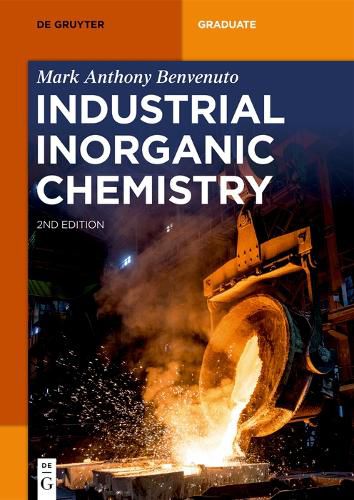Readings Newsletter
Become a Readings Member to make your shopping experience even easier.
Sign in or sign up for free!
You’re not far away from qualifying for FREE standard shipping within Australia
You’ve qualified for FREE standard shipping within Australia
The cart is loading…






Industrial Inorganic Chemistry adds to the previously published graduate level textbooks on Industrial Chemistry by Mark A. Benvenuto. It focuses specifically on inorganic processes, from the largest industrial process for the production of major inorganic chemicals and metals, down to and including smaller niche processes that have become extremely important in maintaining the current quality of life. The book provides a survey on the production of essential elements and compounds, such as sulfuric acid, calcium carbonate, fertilizers as well as numerous metals and alloys. In addition to the fundamental scientific principles each chapter includes discussions on the environmental impacts: mining of raw materials, creation of by-products, pollution, and waste generation, all of which have become key factors for the potential implementation of greener methods. The author also highlights ways in which industry has begun to make industrial inorganic processes more environmentally benign.
Examines major inorganic chemistry processes, their effect on every-day life and current efforts to improve processes or adapt "green" chemical production.
Provides didactic links between theoretical lecture contents and current, largescale chemical processes.
Valuable for students of Inorganic Chemistry, Industrial Chemistry, Chemical Engineering and Materials Science.
$9.00 standard shipping within Australia
FREE standard shipping within Australia for orders over $100.00
Express & International shipping calculated at checkout
Industrial Inorganic Chemistry adds to the previously published graduate level textbooks on Industrial Chemistry by Mark A. Benvenuto. It focuses specifically on inorganic processes, from the largest industrial process for the production of major inorganic chemicals and metals, down to and including smaller niche processes that have become extremely important in maintaining the current quality of life. The book provides a survey on the production of essential elements and compounds, such as sulfuric acid, calcium carbonate, fertilizers as well as numerous metals and alloys. In addition to the fundamental scientific principles each chapter includes discussions on the environmental impacts: mining of raw materials, creation of by-products, pollution, and waste generation, all of which have become key factors for the potential implementation of greener methods. The author also highlights ways in which industry has begun to make industrial inorganic processes more environmentally benign.
Examines major inorganic chemistry processes, their effect on every-day life and current efforts to improve processes or adapt "green" chemical production.
Provides didactic links between theoretical lecture contents and current, largescale chemical processes.
Valuable for students of Inorganic Chemistry, Industrial Chemistry, Chemical Engineering and Materials Science.